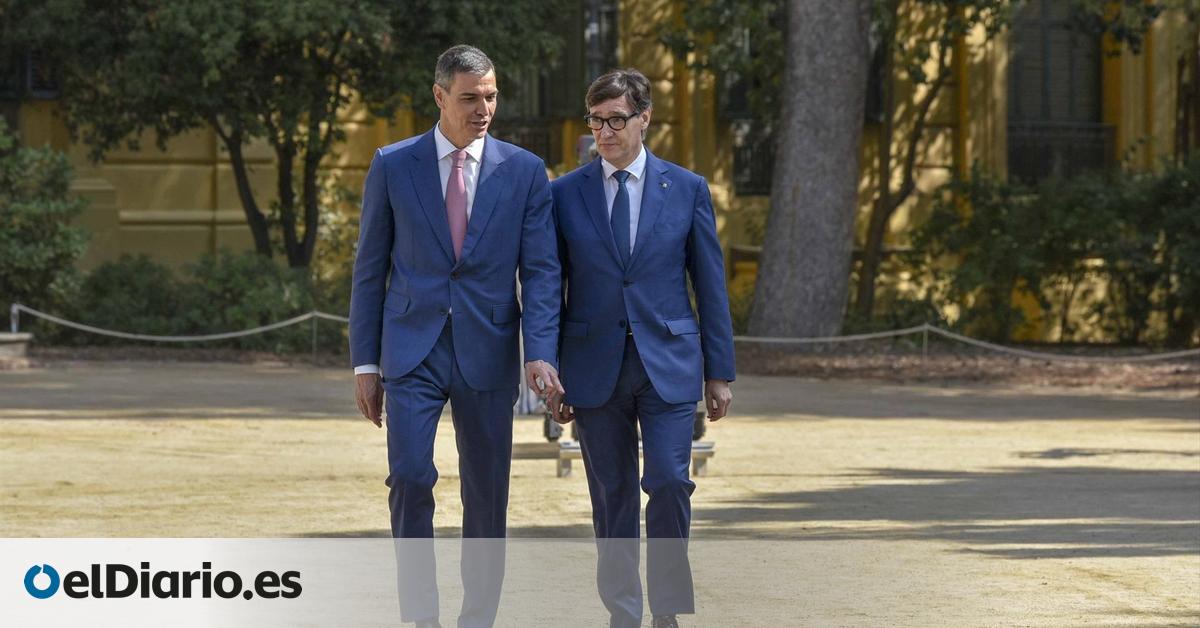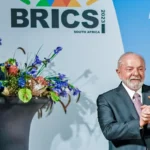
The Government assumes that the Generalitat will collect all the taxes that are generated in Catalonia and that the State will remain with a part through a percentage of participation in such taxes. This is, as ElDiario.es, one of the fundamental pillars on which the new singular financing model of Catalonia has been able to know, whose last fringes are finishing profiling both administrations this week to present it next Monday in the Bilateral State-Generalitat Bilateral Commission, which will be held at the Palau de la Generalitat.
The agreement, which will be “of draft”, according to sources from both governments, contemplates other relevant aspects. First, that the Agència Tributària de Catalunya (ATC) will be the one who manages, collects and obtains all taxes and that this transfer will be carried out gradually. It will begin, as already planned and announced a year ago, by IRPF in 2026, experts consider that it is the most territorializable tax and more linked to fiscal capacity, which will be added to other minor tax figures.
The second is that what technicians call the principle of ordinality will be respected. That is, once the resources destined for territorial rebalancing (solidarity), the volume of per capita resources of the richest communities cannot be below that of the poorest, as is the case today, not only with Catalonia, and, instead, superfinant communities (such as Cantabria, Extremadura, La Rioja, Asturias or Galicia). Ordinality is a red line for Catalonia.
The agreement that both governments sign in the bilateral commission next Monday will have an immediate materialization in the proposal of law that PSOE and ERC intend to register in the next few days in Congress. In it, both parties will introduce a series of legislative changes, including a retouching of the Organic Financing Law (LOFCA), which will allow the State to delegate to the Catalan Tributària, the collection of IRPF and other minor taxes, such as enrollment or VAT of small and medium enterprises (SMEs).
This first legislative reform for the delegation of the collection will be the Rompehielos for the other legal modifications that must arrive later and will prove to what extent there is a majority in Congress to endorse the agreed project between the Treasury, the Government and ERC. The three parties assume that both this first legislative and others that must also be promoted will require a complicated negotiation with all the formations that supported the investiture of Pedro Sánchez.
A armored agreement
Another of the issues in which the negotiators have worked is in the “armor” of the new model beyond the initial moment, a safeguard demanded by the independentistas so as not to be obliged to sustain the government of Sánchez ‘sine die’. “It is evident that you can never guarantee that a new government will not reverse a legal architecture, but it always gives more security the modification of an organic law than an agreement,” negotiation sources explain.
These changes are sufficient for Republican Esquerra de Catalunya (ERC), for whom “the financing model we defend has three legs: that the collection is made from Catalonia, that the ordinality criterion is maintained and that the fiscal deficit is reduced,” said the spokesperson for the Republican formation, Isaac Albert. The spokeswoman of the Government, Sílvia Paneque, was also “convinced” that the bilateral will comply with the investiture pact signed a year ago with the formation led by Oriol Junqueras.
This Monday’s meeting will focus on agreeing on the architecture of the new model and establishing normative changes, not on the figures. The calculations of the contribution of Catalonia to the State for the services it provides (through a percentage of tax participation) and the solidarity mechanism are left for later. The Government keeps key all the scenarios and calculations that its group of experts has drawn for weeks for the negotiations that will come.
According to calculations from Eldiario.es contrasted with several experts with liquidation data of 2021, only with the respect of the Catalonia ordinality criterion would obtain extra income of between 6,000 and 10,500 million euros, depending on whether the purchase power parity is taken into account (it does not cost the same to live in Barcelona as in Badajoz).
Goodbye to the monthly pay pay
Even without figures, the agreement that will be signed on Monday is a great turnaround to the current system, since it goes from a model in which the State is the one who collects and pays according to a complex system of advances and liquidations to the communities, to have total financial capacity from the first moment.
With the current model the communities do not have all the money that is generated in their territory until after two years. Every July, the Ministry of Finance usually carries out two things through the Fiscal and Financial Policy Council (CPFF): First, it tells each community what it will pay the following year so that it can be preparing its budgets. How do you do it? First estimates what will be raised the following year, calculates the amount that touches each community, divides it by 12 and every month an advance transfers. Secondly, it makes the liquidation two years ago, that is, in case its estimates would have fallen short, pay the difference. And the opposite, but does not usually happen.
In 2022, the last year liquidated, the Government underestimated the advance for the set of communities in 20.5 billion euros, 4,324 million in the case of Catalonia, almost 3,000 million in that of Andalusia and 2,685 for the Valencian Community, according to the liquidation of the resources of the financing system of the autonomous communities of common regime.
With this change, the Generalitat may have all the resources that are generated in Catalonia instantly, more than 52,000 million euros, almost half per IRPF, according to data from 2021. It will not depend on the monthly pay of the State or its estimates. The model does not win only in transparency, but increases the financial capacity of the community. Also the financial risk it assumes, but that is why self -government.
In this sense, what for ERC is an exit from the common regime, the government has foreseen that the agreed model for Catalonia can be extended to any autonomous community that also requests it.
The so -called “singular financing” was one of Pere Aragonès Government flags and, in July 2024, it ended up being part of the agreement between PSC and ERC for the investiture of Salvador Illa. The Socialists left behind their initial claim, which was a Catalan Tax Agency consorted with the state, and hugged the defense of a model that supposed the collection by the Generalitat of all taxes and a financing model that meant that Catalunya transferred to the State only the amount of the services provided by the central administration, in addition to a share of solidarity for the rest of the autonomous communities.
Since that time, the Government has made an important effort to put the ATC tune, both in hiring of new personnel and software, a section that some experts indicate as the main problem to be solved to assume the collection.
Choral negotiation
ERC has been negotiating several bands about the new financing of the Generalitat from the beginning of this year, which is one of the maximum priorities for the party. On the part of the Republicans, he is the general director of the formation, Lluís Salvadó, who leads the negotiating team, which has maintained fluid relations both with the Minister of Economy, Alicia Romero, and with the Secretary of State of Finance, Jesús Gascón. This same Friday an important meeting is scheduled to set the last fringes on the legal modification to delegate the collection in the Generalitat.
Negotiation sources indicate that, although most of it has occurred in technical terms, Oriol Junqueras and even the president of the Generalitat, Salvador Illa, have intervened in some moments of the negotiation, at least twice in which the technical aspects had embedded. PSC sources confirm that negotiation has not been paralyzed at any time.
On the part of ERC they also recognize that Minister María Jesús Montero has had an important weight in the good progress of the conversations, although at some times the independence had complained about their role. The vice president is not a simple balance because, in addition to assuming negotiation on the financing of Catalonia and the rest of the communities, he has an important organic role as number two of Sanchez in the PSOE and is also the candidate of her party to preside over the Junta de Andalucía in June 2026.
The forecast of all parties was to present the agreement after Sant Joan, on June 24, which would also have served to comply with the calendar set in the investiture agreement. But the storm unleashed on the PSOE after the publication of the Civil Guard report that indicated to its secretary of Organization, Santos Cerdán, and its subsequent entry in preventive detention, assumed that the Catalan issue would be postponed a few weeks.
Despite this, there was interest in all parties to get it forward on a date that does not exceed the agreed margin too much. ERC also wanted to bring legal modification to Congress as soon as possible, while the Government of Salvador Illa is interested in the Catalan Avance Agenda and the Catalan Executive can exhibit steps forward with its partners.
Source: www.eldiario.es

